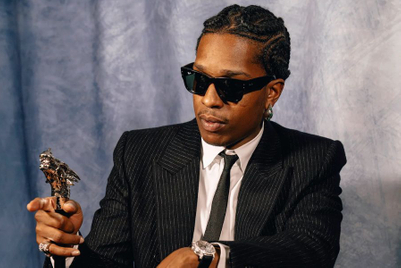
If a Gucci handbag isn't your thing, how about a Gucci burger? At the Gucci Osteria restaurant in Seoul, the fourth restaurant opened by the luxury fashion house in as many years, a burger will cost you 27,000 won (US$20) and a full course menu will set you back between 120,000 won (US$89) to 170,000 won (US$125).
Value for money? Consumers seem to think so. Reservations for the restaurant, which opened earlier this year, were sold out four minutes after it opened.
As pandemic restrictions ease globally, and consumers are eager to go out, it seems the F&B industry is becoming the new segment for luxury fashion brands to conquer as restaurants and cafés bearing their logos pop up nearly every week.

"Launching foodservice propositions allows fashion brands to capitalise on consumers' shift in spend away from retail and towards experiences, which has accelerated following the pandemic," says Pippa Stephens, an analyst for apparels at GlobalData.
And it's these F&B experiences, at a lower price than high-end fashion apparel, that seem to be popular among younger consumers, especially as high inflation, slowing economies and mass layoffs start to bite.
"Not everyone can afford or get a booking at the Polo Bar in Manhattan," says Sai Roshini Daswani, director of client strategy, APAC, Sinclair. "But most can buy their way into Ralph Lauren’s idealised version of American Chic with a latte at a Ralph’s Coffee stand on the street corner."
Luxury lattes: the secret to bringing foot traffic back to brick-and-mortar stores?
In China, where coffee culture has boomed in recent years, there has been a surge of branded cafes opening. In the past year alone, Ralph Lauren opened APAC’s first Ralph’s Bar in Chengdu, alongside Maison Margiela, which unveiled its first café in Chengdu in June before expanding a pop-up presence to Shanghai and Shenzhen.
"Over the last five years the café culture and the high tea trend have boomed in China," says Chloe Reuter, founding partner and CEO at Gusto Luxe. "Coffee shops and restaurants allow brands to engage with entry level luxury consumers, potentially their consumers of tomorrow. I believe it’s a strong first step to creating brand advocacy."
And being able to a sip on a luxury latte painted with Chanel’s Double C logo while munching on a Louis Vuitton trunk cupcake has worked wonders on social media, generating an endless stream of posts. And, of course, selling luxury lattes at $5 and cakes at $10 is an effective way to draw customers back to brick-and-mortar stores, and by offering foodservice they are encouraging consumers to visit who wouldn't usually be enticed to browse.

"With the pandemic and ecommerce developments, it's been more difficult to attract consumers to go offline and back to brick-and-mortar stores to shop," says Yuwan Hu, a China market analyst at Daxue Consulting. "Now brands are having to engage with their audiences differently through more creativeand innovative ways—food services, art galleries, exhibitions, and more may come in the next 12 months."
A recipe for success or a short-lived fad?
Luxury brands are masters at brand extension and have been able to extend, with various degrees of success, across many sectors, such as hotels, homeware, beauty, activewear, and more. But will F&B be high fashion’s next successful foray?
"Demand far exceeds supply for most luxury brands and for this reason alone we’re likely to see brand extensions continue to grow," says Michael Patent, founder and president of Culture Group. "Real estate was a natural extension and an opportunity to use hotels as a canvas for the brand’s creativity. Think Bulgari, Baccarat and Armani in the hotel space. Food and beverage is an even more accessible extension and it ties in with the luxury mall developers that the brands are already in business with."

Yet, while F&B seems a natural extension for luxury fashion brands, Amrita Banta, managing director at Agility Research, believes this will be a small and marginal trend for most luxury groups.
"F&B is a highly competitive and dynamic sector, where trends change very quickly and restaurateurs need to adapt to ever changing guests’ demands and needs," says Banta. "While luxury brands are masters at doing this in specific sectors—apparel, watches, jewellery—they have less experience in the F&B sector, and it will take them a lot of effort and time to build it internally, something which I don’t think will justify the effort in the long term.”
Diluting the brand
While Gucci burgers or Ralph Lauren lattes might whip up social media buzz and can lower the entry barrier for customers to experience luxury brands. Is there a limit to how far a luxury company can diversify its operations without diluting its brand or confusing consumers?
Banta at Agility Research believes there is a limit, and that many fashion brands learnt a painful lesson during the 1980s when a flood of licensing deals over-extended and ultimately destroyed some fashion brands.
"Nowadays, luxury brands are much savvier when approaching brand extensions, and often partner with reputable brands in contiguous sectors they want to expand into, rather than trying to do it solo," says Banta. "We believe that co-branding, if done right and with the right match, is a much more efficient and safe way to test the water in sectors where the brand does not have a specific experience, before deciding to extend the brand in the same space."

And Daswani from Sinclair believes fashion brands will only succeed in F&B if they are able to remain authentic to the core brand ethos while maintaining the elevated levels of quality—and to a certain degree, exclusivity—that the brand has built its reputation upon.
"These brand extensions have to complement the brand’s core product offering, not overshadow it," says Daswani. "After all, Gucci Osteria on every street corner, a la Starbucks, is only going to serve up consumer fatigue and disinterest, with a side of failure, albeit on a silver platter."


.jpg&h=334&w=500&q=100&v=20250320&c=1)


.png&h=334&w=500&q=100&v=20250320&c=1)




.png&h=334&w=500&q=100&v=20250320&c=1)







.png&h=268&w=401&q=100&v=20250320&c=1)
